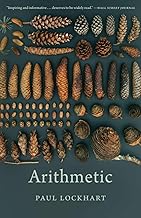
arithmetic by Paul Lockhart
To get the ball rolling on this blog, I’m going to start with a non-fiction book that I doubt many are familiar with, Arithmetic by Paul Lockhart, published in 2019, a thin volume of 240 pages. Now, I know that title is going to turn lots of people off right from the start—it would normally scare me away—but hear me out. It’s not what you think. This is a fantastic book and it doesn’t require knowing or caring anything at all about numbers or calculation. The whole point of the book is to present these topics in an entirely new light.
Many years ago I happened on a short treatise called A Mathematician’s Lament by the same author (which I also recommend and which is available as a free pdf at https://worrydream.com/refs/Lockhart_2002_-_A_Mathematician’s_Lament.pdf), in which he bemoans how math is taught in schools, saying, “if I had to design a mechanism for the express purpose of destroying a child’s natural curiosity and love of pattern-making, I couldn’t possibly do as good a job as is currently being done…. with the kind of senseless, soulcrushing ideas that constitute contemporary mathematics education.”
Arithmetic, which is even more engagingly written than the treatise, performs the amazing feat of actually presenting numbers (and how they got that way), in a totally absorbing and entertaining manner, easy enough for a 5-year-old to comprehend and for an adult to learn from and marvel at, (and, I believe, for a mathematician to take delight in). Starting by imagining different cultures that have no numbers or ways of counting and the kinds of systems they might come up with to compare things, he then shows how actual systems developed and what their advantages and disadvantages are.
Lockhart takes you through all this with wit and humor to an understanding of how machines and even living cells might work according to basic principles demonstrated along the way. This absolutely isn’t a book about how to do math but how to understand and appreciate numbers. He doesn’t view math as a practical necessity but an art form full of beauty. I think most readers are curious and willing to let their minds wander through unexplored pathways, and that’s why I believe that this book will reward most readers who give it a chance.
I especially recommend it those with young children who can be oriented towards math in a positive way before school destroys it for them, or those who, like me, have always feared and shunned math. I will leave you with a short video to introduce you to Lockhart’s ideas in a visual way https://www.youtube.com/watch?v=Ws6qmXDJgwU.

